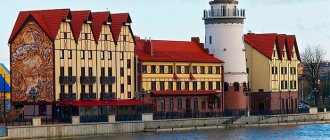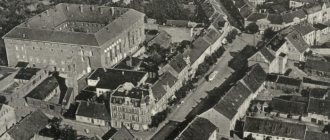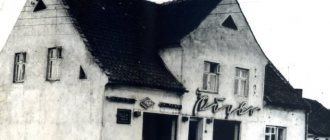This term has other meanings, see Primorsk.
| City Primorsk Coat of arms |
| A country | Russia, Russia |
| Subject of the federation | Kaliningrad regionKaliningrad region |
| Municipal district | Baltic |
| urban settlement | Primorskoye |
| Coordinates | 54°44′00″ n. w. 20°00′00″ E. long / 54.73333° north w. 20.00000° E. d. / 54.73333; 20.00000 (G) [www.openstreetmap.org/?mlat=54.73333&mlon=20.00000&zoom=12 (O)] (Z)Coordinates: 54°44′00″ N. w. 20°00′00″ E. long / 54.73333° north w. 20.00000° E. d. / 54.73333; 20.00000 (G) [www.openstreetmap.org/?mlat=54.73333&mlon=20.00000&zoom=12 (O)] (I) |
| Based | 1268 |
| Former names | until 1946 - Fischhausen |
| City with | 2008 |
| Square | 4 km² |
| Center height | 1 |
| Population | ↘1929[1] people (2016) |
| Timezone | UTC+2 |
| Telephone code | +7 40152 |
| Postcode | 238510 |
| Vehicle code | 39, 91 |
| OKATO code | [classif.spb.ru/classificators/view/okt.php?st=A&kr=1&kod=27405555 27 405 555] |
Audio, photo and video
on Wikimedia Commons
K: Settlements founded in 1268
Primorsk
(until 1946
Fischhausen
, German
Fischhausen
, Polish
Rybaki
, lit. Žuvininkai) is a city in the Baltiysky municipal district of the Kaliningrad region of Russia (in 2005-2008 - an urban-type settlement).
Population - 1929[1] people. (2016).
Story
German period (until 1945)
Founded in 1268 as the city of Fischhausen - in German “fish tank” K: Wikipedia: Articles without sources (type: not specified)[ source not specified 2305 days
]. The feeble-minded Duke Albert Friedrich died in Fischhausen Castle in 1618. As a result, Johann Sigismund united Prussia with Brandenburg. Fischhausen has been a district center since 1818[2]. It had a coat of arms: a shield on which the bishop's crozier crossed with the sword of an order knight (Zamland coat of arms), under them there was a fish with its head up.
Soviet period (until 1991)
Since 1945, part of the USSR. In 1947, it was renamed Primorsk, the new name was assigned due to its location on the shore of the Kaliningrad Bay. In 1946-1963 it was part of the Primorsky district (with its center in the city of Zelenogradsk) and the Zelenogradsky district.
In 1963, the Presidium of the Supreme Council of the RSFSR, by its decree, transferred the city of Primorsk to the subordination of the Svetlovsk City Council.
In 1953, the city Council of Workers' Deputies was formed in Primorsk. Since 1977, it began to be called the Council of People's Deputies and existed until 1994. Executive power in the city was exercised by the Executive Committee of the City Council. The chairmen of the executive committee were[2]:
- A. P. Zateev (1953-1957),
- I. V. Karpov (1957-1959),
- P. T. Nozdrin (1959-1960),
- F. N. Bykov (1960-1965),
- E. P. Kozhevnikova (1965-1981),
- L. M. Medvedeva (1981-1985) and
- G. N. Grigorenko (1985-1994).
Russian period (since 1992)
With the formation of the district, a city administration appeared in Primorsk, whose leaders were G. N. Grigorenko (1994-2001) and A. N. Mamaev (2001-2005)[2].
In 1994, regional authorities decided to form the Baltic urban district and added the city of Primorsk to it. Until 2005, it had the status of a city, but, due to a decrease in population, it was again transformed into an urban-type settlement as part of the Baltic urban district.
In 2008, a law was adopted in the Kaliningrad region on the transformation of the Baltic urban district into a municipal district and on the creation of three municipalities on its territory, including the Primorsky urban settlement. At the same time, Primorsk was returned to the status of a city[3].
Content
- 1History 1.1German period (until 1945)
- 1.2Soviet period (until 1991)
- 1.3Russian period (since 1992)
- 5.1 Educational institutions
Population
| Population | ||||||
| 1782[4] | 1939 | 1946 | 1947[5] | 1959[6] | 1970[7] | 1979[8] |
| 1110 | ↗3879 | ↘195 | ↗600 | ↗2049 | ↘1730 | ↘1706 |
| 1989[9] | 1996[10] | 1998[10] | 2000[10] | 2001[10] | 2002[11] | 2005[10] |
| ↗1792 | ↗2000 | →2000 | →2000 | →2000 | ↗2150 | ↘2100 |
| 2006[10] | 2007[10] | 2008[10] | 2009[12] | 2010[13] | 2011[10] | 2012[14] |
| →2100 | →2100 | →2100 | ↘2087 | ↘1956 | ↗2000 | ↘1950 |
| 2013[15] | 2014[16] | 2015[17] | 2016[1] | |||
| ↘1923 | ↗1945 | ↘1943 | ↘1929 | |||
Climate
The climate of the city is transitional to maritime. Winters are shorter and milder, and summers are cooler than in mainland areas. There is a fairly large amount of precipitation throughout the year. The weather is relatively windy. The warmest month is July. Spring is long, March and April are usually cool, and May is warm.
- Average annual temperature - +7.6 C°
- Average annual wind speed - 2.6 m/s
- Average annual air humidity - 79%
| Climate of Primorsk | |||||||||||||
| Index | Jan. | Feb. | March | Apr. | May | June | July | Aug. | Sep. | Oct. | Nov. | Dec. | Year |
| Absolute maximum | 12,7 | 15,6 | 23,0 | 27,9 | 30,6 | 33,5 | 36,3 | 36,5 | 31,2 | 26,4 | 19,4 | 13,3 | 36,5 |
| Average maximum, °C | 0,4 | 1,2 | 5,4 | 11,4 | 17,6 | 20,5 | 22,1 | 22,0 | 17,0 | 11,8 | 5,4 | 2,1 | 11,5 |
| Average temperature, °C | −1,9 | −1,4 | 1,7 | 6,6 | 12,1 | 15,4 | 17,4 | 17,1 | 12,7 | 8,2 | 3,1 | −0,1 | 7,6 |
| Average minimum, °C | −4,3 | −3,9 | −1,3 | 2,6 | 7,0 | 10,8 | 13,0 | 12,6 | 9,0 | 5,1 | 0,9 | −2,4 | 4,1 |
| Absolute minimum, °C | −32,5 | −33,3 | −21,7 | −5,6 | −3,1 | 0,7 | 4,5 | 1,6 | −2 | −11,2 | −18,7 | −25,6 | −33,3 |
| Precipitation rate | 62 | 46 | 45 | 40 | 51 | 78 | 74 | 84 | 83 | 85 | 78 | 78 | 804 |
| Source: [pogoda.ru.net/climate/26702.htm Weather and climate] | |||||||||||||
Famous people
- Gustav Cordien [de] (1838–1907) - philologist.
- Arthur von Hippel[en] (1841–1916) - ophthalmologist.
- Wilhelm Wien (1864–1928) - Nobel Prize winner in physics.
- Arnold Federmann[de] (1877–1952) - writer, art critic and literary historian.
- Margarete Federmann[de] (1882–1965) - artist.
- Dietrich von Saucken (1892–1980) was a German tank general (1944), the last of 27 recipients of the Knight's Cross with Oak Leaves, Swords and Diamonds.
- Maria Jonas[en] (1893–1944) - doctor.
- Karl Pockern[de] (1895–1933) - butcher, member of the sports club Fichte Berlin[de] and victim of the "bloody week in Köpenick[en]".
- Erika Maria Wigand[de] (1921–2009) - artist and sculptor.
- Arnaud Motulsky[en] (1923–2018) - physician and geneticist, known as the “father of pharmacogenomics”.
- Nikita Burmistrov (1989) is a Russian football player, striker and midfielder.
Social sphere
Educational institutions
MBOUSOSH No. 8. Address: 238510 Baltic city district, Primorsk, Zheleznodorozhnaya street, 2a. Director - Tsigas Elena Aleksandrovna[18].
Cultural institutions
In 1997, the Museum of the History of the City of Primorsk (Fischhausen) was opened, which is located in the House of Culture. Also in the Primorsk Palace of Culture, the City Library is located on the ground floor. Address: 238510, Kaliningrad region, Primorsk, Baltic District, st. Zheleznodorozhnaya, 8. tel. 8-40145-68535.
Children's art school. Address: 238510 Baltic urban district, Primorsk, st. Zheleznodorozhnaya, 10. Year of foundation: 1995. Director: Tymkovan Nikolay Petrovich[19].
Attractions
In any case, a vacation in Primorsk will include visiting attractions and memorable historical places. As a rule, all tourists must attend such excursions.
The city is famous for the following attractions:
- The ruins of Fischhausen Castle, located in its vicinity.
- The German military cemetery, where soldiers who died during the First and Second World Wars are buried.
- The observation tower, built by the Germans, is the oldest structure.
- Museum of the History of Primorsk.
- Bishop's castle from the 18th century.
The modern city has a cultural center, a library, and an art school. If you walk along the bay, you can get to the historical center of the city, which will be of interest to tourists due to its architecture.
Vacationers should definitely visit the Temple of the All-Merciful Savior. You cannot ignore the sign erected in memory of the war, or as it is also commonly called - the Tree of War.
Primorsk, Kaliningrad region, is also famous for its Peace Oak, planted in honor of the end of the Franco-Prussian War back in 1871. And five years ago, in the summer of 2011, a memory park was opened nearby.
An excerpt characterizing Primorsk (Kaliningrad region)
- For what? I don't know. That's how it should be. Besides, I’m going... - He stopped. “I’m going because this life that I lead here, this life is not for me!” A woman's dress rustled in the next room. As if waking up, Prince Andrei shook himself, and his face took on the same expression that it had in Anna Pavlovna’s living room. Pierre swung his legs off the sofa. The princess entered. She was already in a different, homely, but equally elegant and fresh dress. Prince Andrei stood up, politely moving a chair for her. “Why, I often think,” she spoke, as always, in French, hastily and fussily sitting down in a chair, “why didn’t Annette get married?” How stupid you all are, messurs, for not marrying her. Excuse me, but you don’t understand anything about women. What a debater you are, Monsieur Pierre. “I keep arguing with your husband too; I don’t understand why he wants to go to war,” said Pierre, without any embarrassment (so common in the relationship of a young man to a young woman) addressing the princess. The princess perked up. Apparently, Pierre's words touched her to the quick. - Oh, that’s what I’m saying! - she said. “I don’t understand, I absolutely don’t understand, why men can’t live without war? Why do we women don’t want anything, don’t need anything? Well, you be the judge. I tell him everything: here he is his uncle’s adjutant, the most brilliant position. Everyone knows him so much and appreciates him so much. The other day at the Apraksins’ I heard a lady ask: “C’est ca le fameux prince Andre?” Ma parole d'honneur! [Is this the famous Prince Andrei? Honestly!] – She laughed. - He is so accepted everywhere. He could very easily be an adjutant in the wing. You know, the sovereign spoke to him very graciously. Annette and I talked about how this would be very easy to arrange. How do you think? Pierre looked at Prince Andrei and, noticing that his friend did not like this conversation, did not answer. - When are you leaving? - he asked. - Ah! ne me parlez pas de ce depart, ne m'en parlez pas. Je ne veux pas en entendre parler, [Oh, don’t tell me about this departure! “I don’t want to hear about him,” the princess spoke in the same capriciously playful tone in which she spoke with Hippolyte in the living room, and which obviously did not suit the family circle, where Pierre was, as it were, a member. – Today, when I thought that I needed to break off all these dear relationships... And then, you know, Andre? “She blinked significantly at her husband. – J'ai peur, j'ai peur! [I’m scared, I’m scared!] she whispered, shaking her back. The husband looked at her as if he was surprised to notice that someone else besides him and Pierre was in the room; and with cold politeness he turned inquiringly to his wife: “What are you afraid of, Lisa?” “I can’t understand,” he said. – That’s how all men are selfish; everyone, everyone is selfish! Because of his own whims, God knows why, he abandons me, locks me in the village alone. “With your father and sister, don’t forget,” Prince Andrei said quietly. - Still alone, without my friends... And he wants me not to be afraid. Her tone was already grumbling, her lip lifted, giving her face not a joyful, but a brutal, squirrel-like expression. She fell silent, as if finding it indecent to talk about her pregnancy in front of Pierre, when that was the essence of the matter. “Still, I don’t understand, de quoi vous avez peur, [What are you afraid of," Prince Andrei said slowly, without taking his eyes off his wife. The princess blushed and waved her hands desperately. “Non, Andre, je dis que vous avez tellement, tellement change... [No, Andrei, I say: you have so, so changed...] “Your doctor tells you to go to bed earlier,” said Prince Andrei. - You should go to bed. The princess said nothing, and suddenly her short, whiskered sponge began to tremble; Prince Andrei, standing up and shrugging his shoulders, walked around the room. Pierre looked in surprise and naively through his glasses, first at him, then at the princess, and stirred, as if he, too, wanted to get up, but was again thinking about it. “What does it matter to me that Monsieur Pierre is here,” the little princess suddenly said, and her pretty face suddenly blossomed into a tearful grimace. “I’ve been wanting to tell you for a long time, Andre: why did you change so much towards me?” What I did to you? You're going to the army, you don't feel sorry for me. For what? - Lise! - Prince Andrey just said; but in this word there was a request, a threat, and, most importantly, an assurance that she herself would repent of her words; but she continued hastily: “You treat me like I’m sick or a child.” I see everything. Were you like this six months ago? “Lise, I ask you to stop,” said Prince Andrei even more expressively. Pierre, who became more and more agitated during this conversation, stood up and approached the princess. He seemed unable to bear the sight of tears and was ready to cry himself. - Calm down, princess. It seems so to you, because I assure you, I myself experienced... why... because... No, excuse me, there is no stranger here... No, calm down... Goodbye... Prince Andrei stopped him by the hand. - No, wait, Pierre. The princess is so kind that she will not want to deprive me of the pleasure of spending the evening with you. “No, he only thinks about himself,” said the princess, unable to hold back her angry tears. “Lise,” said Prince Andrei dryly, raising his tone to the degree that shows that patience is exhausted. Suddenly the angry, squirrel-like expression of the princess’s beautiful face was replaced by an attractive and compassion-arousing expression of fear; She glanced from under her beautiful eyes at her husband, and on her face appeared that timid and confessing expression that appears on a dog, quickly but weakly waving its lowered tail. - Mon Dieu, mon Dieu! [My God, my God!] - said the princess and, picking up the fold of her dress with one hand, she walked up to her husband and kissed him on the forehead. “Bonsoir, Lise, [Good night, Liza,” said Prince Andrei, getting up and politely, like a stranger, kissing his hand. The friends were silent. Neither one nor the other began to speak. Pierre glanced at Prince Andrei, Prince Andrei rubbed his forehead with his small hand. “Let’s go have dinner,” he said with a sigh, getting up and heading to the door. They entered the elegantly, newly, richly decorated dining room. Everything, from napkins to silver, earthenware and crystal, bore that special imprint of novelty that happens in the household of young spouses. In the middle of dinner, Prince Andrei leaned on his elbow and, like a man who has long had something on his heart and suddenly decides to speak out, with an expression of nervous irritation in which Pierre had never seen his friend, he began to say: “Never, never get married, my friend; Here's my advice to you: don't get married until you tell yourself that you did everything you could, and until you stop loving the woman you chose, until you see her clearly; otherwise you will make a cruel and irreparable mistake. Marry an old man, good for nothing... Otherwise, everything that is good and lofty in you will be lost. Everything will be spent on little things. Yes Yes Yes! Don't look at me with such surprise. If you expect something ahead from yourself, then at every step you will feel that everything is over for you, everything is closed, except for the living room, where you will stand on the same level as a court lackey and an idiot... What!... He energetically waved his hand . Pierre took off his glasses, causing his face to change, showing even more kindness, and looked at his friend in surprise. “My wife,” continued Prince Andrei, “is a wonderful woman.” This is one of those rare women with whom you can be at peace with your honor; but, my God, what I wouldn’t give now not to be married! I’m telling you this alone and first, because I love you. Prince Andrei, saying this, looked even less like than before that Bolkonsky, who was lounging in Anna Pavlovna’s chair and, squinting through his teeth, spoke French phrases. His dry face was still trembling with the nervous animation of every muscle; the eyes, in which the fire of life had previously seemed extinguished, now shone with a radiant, bright shine. It was clear that the more lifeless he seemed in ordinary times, the more energetic he was in these moments of almost painful irritation. “You don’t understand why I’m saying this,” he continued. – After all, this is a whole life story. You say Bonaparte and his career,” he said, although Pierre did not talk about Bonaparte. – You say Bonaparte; but Bonaparte, when he worked, walked step by step towards his goal, he was free, he had nothing but his goal - and he achieved it. But tie yourself to a woman, and like a shackled convict, you lose all freedom. And all that you have of hope and strength, everything only weighs you down and torments you with remorse. Living rooms, gossip, balls, vanity, insignificance - this is a vicious circle from which I cannot escape. I am now going to war, to the greatest war that has ever happened, but I know nothing and am no good for anything. “Je suis tres aimable et tres caustique, [I am very sweet and very eater,” continued Prince Andrei, “and Anna Pavlovna listens to me.” And this stupid society, without which my wife and these women cannot live... If only you could know what it is toutes les femmes distinguees [all these women of good society] and women in general! My father is right. Selfishness, vanity, stupidity, insignificance in everything - these are women when they show everything as they are. If you look at them in the light, it seems that there is something, but nothing, nothing, nothing! Yes, don’t get married, my soul, don’t get married,” Prince Andrei finished.








